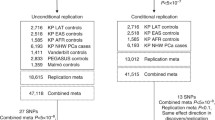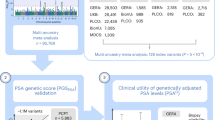Abstract
We evaluated the impact of genetic variation in the prostate-specific antigen (PSA) gene (rs266882) on serum PSA levels in healthy men as well as risk factors for benign prostate hypertrophy (BPH) and prostate cancer. The study population comprised 91 men with PSA levels below 2.0 ng/ml as healthy controls, 78 men with PSA 2–10 ng/ml as a BPH group, and 128 prostate cancer patients, all in Korea. DNA was amplified by polymerase chain reaction and the product was sequenced. We found that PSA levels were associated with a G/A polymorphism only in healthy controls. The transition, however, was not associated with PSA levels of BPH and cancer patients, nor was it a risk factor. In conclusion, this genetic factor is important for determining serum PSA levels in the naive group, whereas the disruption of prostatic architecture in BPH or prostate cancer may be a major determining factor for PSA levels.
Similar content being viewed by others
References
Carson C 3rd, Rittmaster R (2003) The role of dihydrotestosterone in benign prostatic hyperplasia. Urology 61(4 Suppl 1):2–7
Catalona WJ, Ramos CG, Carvalhal GF, Yan Y (2000) Lowering PSA cutoffs to enhance detection of curable prostate cancer. Urology 55:791–795
Chodak G (1994) Conservative management of clinically localized prostate cancer. Can J Oncol 4(Suppl 1):20–23
Chou R, Croswell JM, Dana T, Bougatsos C, Blazina I, Fu R, Gleitsmann K, Koenig HC, Lam C, Maltz A, Rugge JB, Lin K (2011) Screening for prostate cancer: a review of the evidence for the U.S. Preventive Services Task Force. Ann Intern Med 155:762–771
Cramer SD, Chang BL, Rao A, Hawkins GA, Zheng SL, Wade WN, Cooke RT, Thomas LN, Bleecker ER, Catalona WJ, Sterling DA, Meyers DA, Ohar J, Xu J (2003) Association between genetic polymorphisms in the prostate-specific antigen gene promoter and serum prostate-specific antigen levels. J Natl Cancer Inst 95:1044–1053
Cramer SD, Sun J, Zheng SL, Xu J, Peehl DM (2008) Association of prostate-specific antigen promoter genotype with clinical and histopathologic features of prostate cancer. Cancer Epidemiol Biomarkers Prev 17:2451–2457
Gabriel SB, Schaffner SF, Nguyen H, Moore JM, Roy J, Blumenstiel B, Higgins J, DeFelice M, Lochner A, Faggart M, Liu-Cordero SN, Rotimi C, Adeyemo A, Cooper R, Ward R, Lander ES, Daly MJ, Altshuler D (2002) The structure of haplotype blocks in the human genome. Science 296:2225–2229
Gsur A, Preyer M, Haidinger G, Zidek T, Madersbacher S, Schatzl G, Marberger M, Vutuc C, Micksche M (2002) Polymorphic CAG repeats in the androgen receptor gene, prostate-specific antigen polymorphism and prostate cancer risk. Carcinogenesis 23:1647–1651
He D, Wang M, Chen X, Gao Z, He H, Zhau HE, Wang W, Chung LW, Nan X (2004) Ethnic differences in distribution of serum prostate-specific antigen: a study in a healthy Chinese male population. Urology 63:722–726
Hekal IA (2009) The patients less than 50 years: is there a need to lower the PSA cutoff point? Prostate Cancer Prostatic Dis 12:148–151
Jemal A, Ward E, Thun M (2010) Declining death rates reflect progress against cancer. PLoS ONE 5:e9584
Jesser C, Mucci L, Farmer D, Moon C, Li H, Gaziano JM, Stampfer M, Ma J, Kantoff P (2008) Effects of G/A polymorphism, rs266882, in the androgen response element 1 of the PSA gene on prostate cancer risk, survival and circulating PSA levels. Br J Cancer 99:1743–1747
Kloss-Brandstätter A, Schäfer G, Erhart G, Hüttenhofer A, Coassin S, Seifarth C, Summerer M, Bektic J, Klocker H, Kronenberg F (2010) Somatic mutations throughout the entire mitochondrial genome are associated with elevated PSA levels in prostate cancer patients. Am J Hum Gene 87:802–812
Lai J, Kedda MA, Hinze K, Smith RL, Yaxley J, Spurdle AB, Morris CP, Harris J, Clements JA (2007) PSA/KLK3 AREI promoter polymorphism alters androgen receptor binding and is associated with prostate cancer susceptibility. Carcinogenesis 28:1032–1039
Lee G, Park J, Kim B, Kim SA, Yoo CK, Seong WK (2006) OmpA genotyping of Chlamydia trachomatis from Korean female sex workers. J Infect 52:451–454
Lee SE, Kwak C, Park MS, Lee CH, Kang W, Oh SJ (2000) Ethnic differences in the age-related distribution of serum prostate-specific antigen values: a study in a healthy Korean male population. Urology 56:1007–1010
Medeiros R, Morais A, Vasconcelos A, Costa S, Pinto D, Oliveira J, Carvalho R, Lopes C (2002) Linkage between polymorphisms in the prostate specific antigen ARE1 gene region, prostate cancer risk, and circulating tumor cells. Linkage between polymorphisms in the prostate specific antigen ARE1 gene region, prostate cancer risk, and circulating tumor cells. Prostate 53:88–94
Park SW, Kim CS, Lee G (2010) Association of polymorphisms in the prostate-specific antigen (PSA) gene promoter with serum PSA level and PSA changes after dutasteride treatment in Korean men with benign prostatic hypertrophy. Korean J Urol 51:824–830
Pienta KJ (2009) Critical appraisal of prostate-specific antigen in prostate cancer screening: 20 years later. Urology 73(5 Suppl):S11–S20
Rao A, Chang BL, Hawkins G, Hu JJ, Rosser CJ, Hall MC, Meyers DA, Xu J, Cramer SD (2003) Analysis of G/A polymorphism in the androgen response element I of the PSA gene and its interactions with the androgen receptor polymorphisms. Urology 61:864–869
Salinas CA, Austin MA, Ostrander EO, Stanford JL (2005) Polymorphisms in the androgen receptor and the prostate-specific antigen genes and prostate cancer risk. Prostate 65:58–65
Schatzl G, Madersbacher S, Gsur A, Preyer M, Haidinger G, Haitel A, Vutuc C, Micksche M, Marberger M (2002) Association of polymorphisms within androgen receptor, 5alpha-reductase, and PSA genes with prostate volume, clinical parameters, and endocrine status in elderly men. Prostate 52:130–138
Severi G, Hayes VM, Neufing P, Padilla EJ, Tilley WD, Eggleton SA, Morris HA, English DR, Southey MC, Hopper JL, Sutherland RL, Boyle P, Giles GG (2006) Variants in the prostate-specific antigen (PSA) gene and prostate cancer risk, survival, and circulating PSA. Cancer Epidemiol Biomarkers Prev 15:1142–1147
Smith CV, Bauer JJ, Connelly RR, Seay T, Kane C, Foley J, Thrasher JB, Kusuda L, Moul JW (2000) Prostate cancer in men age 50 years or younger: a review of the Department of Defense Center for Prostate Disease Research multicenter prostate cancer database. J Urol 164:1964–1967
Stephan C, Miller K, Jung K (2011) Is there an optimal prostate-specific antigen threshold for prostate biopsy? Expert Rev Anticancer Ther 11:1215–1221
Witte JS (2010) Personalized prostate cancer screening: improving PSA tests with genomic information. Sci Transl Med 2:62ps55
Xu J, Meyers DA, Sterling DA, Zheng SL, Catalona WJ, Cramer SD, Bleecker ER, Ohar J (2002) Association studies of serum prostate-specific antigen levels and the genetic polymorphisms at the androgen receptor and prostate-specific antigen genes. Cancer Epidemiol Biomarkers Prev 11:664–669
Xue W, Irvine RA, Yu MC, Ross RK, Coetzee GA, Ingles SA (2000) Susceptibility to prostate cancer: interaction between genotypes at the androgen receptor and prostate-specific antigen loci. Cancer Res 60:839–841
Xue WM, Coetzee GA, Ross RK, Irvine R, Kolonel L, Henderson BE, Ingles SA (2001) Genetic determinants of serum prostate-specific antigen levels in healthy men from a multiethnic cohort. Cancer Epidemiol Biomarkers Prev 10:575–579
Acknowledgments
This work was supported by a Research Fund of Dankook University in 2010. The authors thank all patients and cancer-free persons for providing samples.
Author information
Authors and Affiliations
Corresponding author
Rights and permissions
About this article
Cite this article
Song, J., Park, H. & Lee, G. Contribution of Genetic Variation rs266882 to Prostate-Specific Antigen Levels in Healthy Controls with Serum PSA Below 2.0 ng/ml. Biochem Genet 51, 264–274 (2013). https://doi.org/10.1007/s10528-012-9561-x
Received:
Accepted:
Published:
Issue Date:
DOI: https://doi.org/10.1007/s10528-012-9561-x




